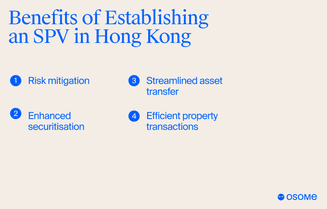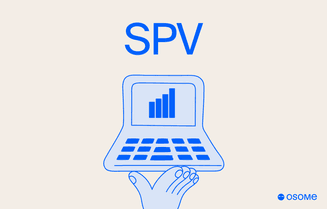What Is a Special Purpose Vehicle (SPV) in Hong Kong, and How Does It Work?
- Published: 6 June 2024
- 12 min read
- Starting a Company


Gabi Bellairs-Lombard
Author
Gabi creates content that inspires. She's spent her career writing compelling website copy, and now she specialises in product marketing copy. As the voice of our products and features, Gabi makes complex business finance and accounting topics easy to understand. Her top priority is ensuring that her words impact and inspire her readers.
What exactly is a Special Purpose Vehicle (SPV), and how can it benefit your business in Hong Kong?
An SPV is an independent or separate legal entity designed to manage specific financial operations, from mitigating risks to facilitating acquisitions.
This article will delve into the creation, use, and benefits of a Special Purpose Vehicle in Hong Kong’s financial environment, providing a clear roadmap for leveraging this powerful tool in your strategic arsenal.
Key Takeaways
- A Special Purpose Vehicle (SPV) is a separate legal entity created to isolate financial risk, secure assets, and facilitate property transactions, among other strategic financial functions.
- The establishment of a Special Purpose Vehicle for Hong Kong companies requires compliance with legal formalities in Hong Kong.
- A Special Purpose Vehicle offers key benefits in global business ventures, including accessing the Chinese mainland market
What Is a Special Purpose Vehicle, SPV?
A Special Purpose Vehicle (SPV) is a separate company or a separate legal entity from a parent company created with a specific objective in mind.
This could range from securitising assets to undertaking risky projects, all the while shielding the parent company (and the parent company's assets) from potential financial fallout. Special Purpose Vehicles possess their own legal status and assets, operating independently from the parent company.
If you're considering setting up an SPV or any other type of company, our company registration services can help you navigate the process smoothly!

Despite its separate identity, a Special Purpose Vehicle-SPV is not a standalone entity in the traditional sense. Rather, it is often linked to its parent company or other entities through financial or legal arrangements. For instance, an SPV might be known as a “bankruptcy remote entity,” which underscores its unique role and structure compared to a broader Special Purpose Entity (SPE).
For clarity, a bankruptcy remote entity (BRE) is a legal entity created to minimise the risk that it will be affected by the bankruptcy of its parent company or other affiliated entities. By isolating specific assets within a BRE from the parent company's assets, companies can protect those assets from being affected by the parent company's financial difficulties. This is particularly useful in structured finance and securitisation transactions.
Some other common types of special purpose vehicles in Hong Kong include:
- Securitisation Special Purpose Vehicle
- Real Estate Special Purpose Vehicle
- Project Finance Special Purpose Vehicle
- Joint Venture Special Purpose Vehicle (common in the energy sector, for example, a power plant)
- Asset Holding Special Purpose Vehicle
- Trust Special Purpose Vehicle
Benefits of Establishing Special Purpose Vehicles
Establishing a Special Purpose Vehicle is not merely a procedural step—it’s a strategic decision that can unlock numerous benefits. From risk management and asset separation to facilitating capital raises or investments, there are myriad reasons why businesses turn to set up a separate company in the form of a Special Purpose Vehicle.
Now, let’s examine these benefits in detail.

1 Risk mitigation
A Special Purpose Vehicle SPV serves as a protective shield, isolating financial risk and ensuring that even if the parent company faces bankruptcy, the Special Purpose Entity remains unaffected. This allows the parent company to venture into riskier territories, knowing that potential negative financial consequences will be contained within the Special Purpose Vehicle and its specific assets, thereby safeguarding the parent company and its investors.
A Special Purpose Vehicle, SPV can also play a pivotal role in securitising debt obligations by acting as a reassurance for investors regarding the repayment of investments. They can participate as counterparties in derivative transactions that are sensitive to credit, such as swaps, thus managing financial risk through market instruments.
The ability to legally separate the parent company’s specific assets using a Special Purpose Vehicle as a separate legal can isolate financial risk and protect the parent company from financial risks associated with those assets.
2 Enhanced securitisation
SPVs play a key role in the securitisation process. They enable companies to:
- Transfer assets, which are then used to issue securities backed by these assets
- Raise additional capital
- Offload credit risk onto investors who purchase tranches, catering to the unique credit risk preferences of different investors.
In the securitisation process, SPVs contribute by:
- Ensuring legal isolation and bankruptcy remoteness
- Safeguarding securitised assets in the event of the originator’s bankruptcy or financial distress
- Transferring assets such as mortgage loans or real estate to an SPV. Here, the SPV is essentially holding major assets and managing them on behalf of investors
- Insulating investors from the financial risks and liabilities of the originator
- This potentially leads to better credit ratings for securitised securities due to the perception of lowered credit risk and higher security.
3 Streamlined asset transfer
The use of SPVs can greatly simplify the transfer of assets. They enable investment managers to channel more capital into a particular asset, increasing their influence and control over the asset. Furthermore, they can facilitate co-investment opportunities for limited partners who wish to invest additional capital in a specific company without disrupting other investors.
The use of SPVs can streamline administration processes as they:
- Only require the SPV to sign documents
- Reduce the impact of shareholder changes on the share structure of the underlying portfolio
- Enable the transfer of assets in a more streamlined manner
4 Efficient property transactions
SPVs are particularly beneficial in the realm of real estate. They function as independent subsidiary companies that are set up specifically to transfer and confer ownership of real estate assets. Shareholders of a real estate SPV are entitled to the income generated from the properties it owns, and all financial activities are recorded in the subsidiary’s accounts.
An attractive benefit of using SPVs in real estate is the potential for tax efficiency. Hong Kong does not impose a capital gain tax, so profits from the sale of real estate held by an SPV are not taxed as a capital gain. This can result in significant tax savings
Step-by-Step Guide to Creating an SPV in Hong Kong
Now that we’ve explored the benefits of Special Purpose Vehicles let’s guide you through the process of creating one in Hong Kong. We’ll walk you through the pre-incorporation essentials, the incorporation procedure, and what to do after you’ve successfully incorporated your SPV.
Pre-incorporation essentials
The first step in setting up an SPV is choosing a unique company name. This name should comply with Hong Kong regulations, meaning it should be in either English or Chinese, and it should not resemble the name of an existing company.
Alongside choosing a unique company name, you must associate this name with a physical address located in Hong Kong. This is an essential step to ensure that your SPV is legally registered and recognised as a separate entity in Hong Kong.
Incorporation procedure
After settling on a unique company name and a registered address in Hong Kong, the next step involves meeting the essential criteria for registering an SPV in Hong Kong. To comply with the regulations, you must submit completed registration forms containing the necessary information to the Companies Registry. This formalises the registration of your SPV.
Typically, registration for an SPV in Hong Kong is completed within approximately four working days following the payment of registration fees.

Post-incorporation compliance
Once your SPV is officially registered, you will need to comply with certain post-incorporation requirements. These include complying with the Companies Ordinance.
The Companies Ordinance requires you to hold annual general meetings, the filing of annual returns, and the keeping of proper accounting records.
In addition, you’ll need to make annual declarations to the Companies Registry to confirm ongoing compliance with statutory requirements. Proper tax planning is also essential for SPVs to optimise their tax position, such as determining tax residency and leveraging double taxation agreements.
How To Structure Your SPV?
Choosing the right structure for your SPV is a crucial decision that will largely depend on the specific needs and objectives of your business. In Hong Kong, an SPV can be structured in various forms, such as:
- Limited partnership
- Trust
- Corporation
- Limited liability corporation
The Hong Kong company structure, known as the Private Limited Company, is the predominant choice for Hong Kong companies when establishing SPVs in Hong Kong.
Limited Partnership vs. Private Limited Company
When choosing between limited partnerships and a private limited company, there are several key factors to consider. For a Hong Kong SPV, key personnel such as at least one director, a company secretary, and one shareholder are required. Establishing a Hong Kong limited company as an SPV requires a registered address within Hong Kong, a defined share capital, in addition to key personnel.
The governance of a private limited company SPV is typically more structured than that of an LP. This is due to the need for designated roles such as directors and a company secretary. A private limited company may be more suitable as an SPV when a formal organisational structure with clearly defined roles is desirable or required.
Notably, a Hong Kong SPV cannot be structured as an Excepted Private Company, as this entity type is reserved solely for individual ownership.
General vs. Limited Partnership
Another important point is choosing between a general or limited partnership.
While it is technically possible to set up an SPV as a general partnership in Hong Kong, it is not typically recommended due to the unlimited liability and management complexities associated with general partnerships.
The preferred and more advantageous structures for SPVs are private limited companies or limited partnerships, which provide limited liability, ease of management, and greater appeal to investors. These structures better align with the primary goals of SPVs, such as the ability to isolate the SPV, liability protection legally, and efficient capital raising.
Each SPV structure has distinct features that may be advantageous in specific scenarios, such as asset protection or tax considerations. Evaluating all legal structures is crucial when establishing an SPV to ensure it aligns with the particular financial and legal requirements of the underlying transaction or project.
The Role of SPVs in Global Business Ventures
Today, SPVs feature prominently in cross-border transactions, reflecting their evolving role in international business activities.
In recent times, startups, venture capitalists (VCs), angel investors, and other investors in Hong Kong have begun incorporating the use of SPVs in the funding stage of business. This trend exemplifies the broader integration of SPVs in the global business landscape, influencing the scope and nature of international business ventures.
Accessing markets in China
For businesses eyeing the lucrative China market, a Hong Kong SPV can offer a strategic advantage. The use of a Special Purpose Vehicle in Hong Kong provides a foothold for accessing and leveraging the second-largest economy of mainland China.
Traditionally, financial institutions and those in the real estate industry have used Hong Kong SPVs to make highly leveraged or speculative investments to raise capital without risking the entire company. This has allowed them to tap into the burgeoning Chinese market while allowing them to mitigate risks.
SPVs in public-private partnerships
SPVs also play a critical role in public-private partnerships, particularly in executing large-scale infrastructure projects. These partnerships allow for shared expertise, risk, and resources between the public and private sectors, with the SPV serving as the central legal entity through which project development and operation are channelled.
In public-private projects, SPVs (Special Purpose Vehicles) ensure:
- A focal point for governance, financial control, and contractual relationships, providing clarity of operations and project stability
- A crucial role in risk sharing and allocation
- Facilitate financing by acting as entities through which capital can be raised for the project.

Navigating Legal Implications and Tax Benefits
Operating an SPV comes with its own set of legal implications and potential tax benefits. It’s crucial to understand these aspects to ensure that your SPV operates within legal boundaries and leverages tax advantages effectively.
Legal entity responsibilities
An SPV is a separate legal entity with its own set of responsibilities. These include establishing a corporate governance framework that includes the creation of a board of directors and the mandate to hold annual general meetings. The directors of an SPV are tasked with overseeing operations and ensuring that the SPV’s activities are in compliance with relevant laws and regulations.
To maintain its separate legal status, an SPV must ensure a clear separation of its liabilities and assets, which shields the assets from the parent company’s financial obligations.
Failure to adhere to these legal and regulatory requirements can lead to penalties.
Tax efficiency strategies
Hong Kong is a preferred jurisdiction for SPVs due to its tax advantages. These include low corporate tax rates and a Taxation Avoidance Agreement with China, which helps SPVs to avoid double taxation in cross-border scenarios.
By creating an SPV to own properties for sale, it is possible to focus taxing on capital gain instead of incurring property sales tax, achieving greater tax efficiency. Foreign investors also use SPVs to leverage tax reductions and advantages such as profits taxed only once, no capital gains tax, and no withholding tax on dividends.
Certain profits from sources outside Hong Kong can also be exempt from taxes when using an SPV.
Real-World Applications of SPVs
The versatility of SPVs is best illustrated through real-world examples.
One common application is in the securitisation of loans. Banks often use SPVs to issue mortgage-backed securities from a pool of mortgages, separating the loans from the bank’s other obligations.
SPVs are also used by companies to hold hard-to-transfer assets, which they can later transfer by selling the SPV itself, facilitating merger and acquisition processes. To avoid higher taxes on property sales, a company may form an SPV to hold the properties and then sell the SPV, paying taxes on the capital gains from the sale instead of the property sales tax.
Venture capitalists often use SPVs to consolidate a pool of capital to invest in startups, usually making a single investment into a business.
Summary
From securitising assets and managing risks to facilitating mergers and acquisitions, Special Purpose Vehicles have proven to be a versatile tool in the financial landscape. Choosing Hong Kong as the jurisdiction for an SPV provides numerous benefits, from low corporate tax rates to easy access to the booming Chinese market. While the process of setting up an SPV involves careful planning and compliance with legal requirements, the strategic benefits it offers make it a worthwhile endeavour for businesses looking to expand their horizons.
If you are looking to incorporate a company in Hong Kong, you can contact Osome experts. Depending on your needs, we offer different registration packages and streamline the entire process for you.
FAQ
How do I create a special purpose vehicle company in Hong Kong?
To create an SPV company in Hong Kong, you need to choose a unique company name, register the company with the Companies Registry, and comply with post-incorporation legal and tax requirements.
What are the benefits of establishing a separate legal entity from a parent company?
Establishing an SPV company offers benefits such as risk mitigation, enhanced securitisation, streamlined asset transfer, and efficient property transactions.
What are the legal implications and tax benefits of an SPV?
An SPV has legal responsibilities like obeying laws and regulations while also providing tax benefits, such as low corporate tax rates in certain regions and exemptions for profits from specific sources.
Are Special Purpose Vehicles the same as a Holding Company?
A Special Purpose Vehicle in Hong Kong and a holding company serve distinct roles, though they can sometimes overlap in certain aspects.
A holding company is primarily created as an investment vehicle or to own shares of another Hong Kong company. Its main purpose is to control and manage these subsidiaries, streamline management, and centralise control of each company. Special Purpose Vehicles, on the other hand, are set up to isolate financial risk or undertake separate business activities.
More like this
Get expert tips and business insights
By clicking, you agree to our Terms & Conditions,Privacy and Data Protection Policy
We’re using cookies! What does it mean?






